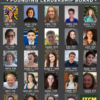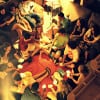Thursday, May 14th | 35th day of the omer – malchut she’b’hod Dear All, We’re ending the fifth week of this seven-week journey towards the giving of the Torah, and choosing a different kind of freedom. In the world of the kabbalists, today is associated with “malchut she’b’hod.” Hod is about beauty and simplicity and malchut is about getting out into the world and making things happen. So it’s a day to introduce the new Jewish Youth Climate Movement. Anyone under the age of twenty today could reasonably hope to be alive in 2100. What will the world look like then? We don’t know, but the decisions and choices of those of us who are older will decisively impact, for good or for ill, those who are younger. (If you want to see a very intense example of that, check out this chart, showing opinions on Brexit, by age, in the UK, in 2018.) This grows out of our long-term work at Teva, and out of the sense that an organization like Hazon ought to be trying, as much as we can, to support and empower and network the best of our young people. So… I hand you over now to a message from the teen board members of JYCM… […]







